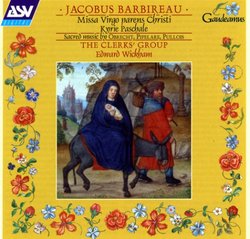| All Artists: Obrecht, Barbireau, Paschale, Wickham Title: Missa Virgo Parens Christi Members Wishing: 0 Total Copies: 0 Label: Gaudeamus Release Date: 11/16/1999 Genre: Classical Styles: Opera & Classical Vocal, Chamber Music, Historical Periods, Classical (c.1770-1830), Early Music Number of Discs: 1 SwapaCD Credits: 1 UPC: 743625018820 |
Search - Obrecht, Barbireau, Paschale :: Missa Virgo Parens Christi
 | Obrecht, Barbireau, Paschale Missa Virgo Parens Christi Genre: Classical
|
Larger Image |
CD Details |
CD ReviewsExaltation! Exultation! Exuberance! Giordano Bruno | Wherever I am, I am. | 02/28/2009 (5 out of 5 stars) "Jacobus Barbireau (d. 1491) and Jabob Obrecht (d. 1505) are both more exuberant composers than their better know contemporary Josquin Desprez (d. 1521). Their exuberance appears in their upbeat, irregular rhythmic inventiveness, mixing duple and triple rhythms, and in their willingness to let their treble voices soar. If a mass by Obrecht sounds more or less like one by Josquin, then the conductor of the consort needs to have his baton examined.
Barbireau died young, at age 36, which was just as premature in 1491 as in 2009. A large part of what we know about him comes from the lamentations written about his early death by other musicians. He was apparently a homebody, spending most of his career in or near Antwerp, and perhaps as much a humanist scholar as a composer, with the academic title of "magister." He corresponded with other humanists around Europe, though his letters are lost, and he wrote poetry in Latin. In the 1480s, he accepted the position of choirmaster at the Church of Our Lady in Antwerp, which probably led to the composition of the mass recorded here. His successor in that position in 1491 was Jacob Obrecht. Obrecht lived longer, to age 54, and traveled farther than Barbireau, at least as far as the famous Toledo summit of kings in Spain. In fact, his music must have had a vogue in Spain, enough to influence the development of Spanish music in the 'Golden Age.' While Josquin's music is intrinisically 'serene' - even in his secular chansons like Baises Moi or Bergerette Savoienne - and Barbireau's is exuberant, Obrecht's emotional reach is huge, from grief and penitence to jolliness and frenzy. The motets on this CD cover a good part of that affective range in Latin, but to discover the Bacchic Obrecht you'll have to hear his Flemish songs and instrumental carmina on a different CD. The jewel of the four motets on this CD is the Salve Sancta Facies, on which he lets all the wild prolations of his rhythmic imagination fly loose at once like uncaged song birds. Let me try to evoke the musical characters of these great Flemish composers by a comparison to painters whose works most people have seen. Josquin is the Raphael of music, always serene, clear, and spacious. Barbireau reminds me of Paolo Uccello, a painter of bright pageantry and movement. Obrecht is Breughel in acoustic variety. The Barbireau mass performed here is quite lavish and ambitious for its era. It's composed in five parts, but at times the parts, especially the superius, are split into brief double harmonies at thirds and fourths. This is clear evidence that the mass was composed to be sung by a choir with two or more voices on each line. The effect is thrilling when it happens. In fact, I have some instinctive suspicion that such harmonic improvisation was an ancient habit and common practice of liturgical choristers in the 15th C. In any case, this is a very fine, vigorous mass, which will stand comparison to those of the divine Josquin. The Clerks' Group, led by Edward Wickham, is the premiere vocal ensemble of the Franco-Flemish repertoire. I doubt that even Ockeghem ever had a finer chorus at his disposal. The Clerks include women sopranos - on this disk, Carys Lane and rebecca Outram - who have mastered the art of sounding very like male sopranos. That's a high compliment, mes amis! The result is a unity of vocal timbre and exactly the balance of voices high and low that is absolutely essential for such polyphony. Of all the English vocal consorts performing music of the 15th and 16th Centuries, The Clerks' Group has the most polished and expressive sound. For earlier repertoires - Dufay and before - it would be the Orlando Consort or the Binchois Consort, singing one on a part. If some asked me how to assemble a collection of the best performances of Franco-Flemish music, I'd declare simply, "start with ALL the recordings of the Cherks' Group!" They've systematically recorded all the masses of Johannes Ockeghem, and have produced so far three superb recordings of Josquin. You'll soon have a chance, by the way, to compare them head to head with The Tallis Scholars; the Cherks have a CD of Josquin's Missa Malheur Me Bat, and the Tallis Scholars have a performance of the same mass soon to be released. Meanwhile, the Clerks' Group recording of Obrecht's Missa Malheur Ma Bat (yes, the same melodic theme) provides a different possibility for comparison, of the two composers. I'd list all the CDs released by the Clerks' Group, but you can find them easily enough with an amazon search. Everyone one of them is supreme in its class." |

 Track Listings (12) - Disc #1
Track Listings (12) - Disc #1